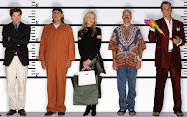 For the most part, I enjoyed the series premiere of Kings, a modernist update to the David and Goliath/rise of King David Biblical account set in a parallel Manhattan, known as Shiloh (in the country of Gilboa), that is ruled by a recently developed monarchy. I enjoyed the acting well enough -- Ian McShane was amazing, but he's amazing in pretty much everything, so that comment is both obligatory and obvious. The actor who plays David, Chris Eagan, is a decent actor (although I didn't like the scene, I enjoyed his delivery of "You want blood? Come and take it!" while carrying the bloody sheet his brother recently died on), but he is a little too pretty boy for me. His face doesn't have any wrinkles, and his eyes are very small, so I only ever caught two expressions from him: either confused/unhappy (furrowed brow) or happy (smiling). The actor playing the king's son Jack, Sebastian Stan (who is apparently Leighton Meester's boyfriend), was phenomenal. The conversation where Daddy King berates him for his homosexuality nightlife is terrifying, but only because there was such animosity and disgust, such horror on Stan's face, it was a wonderfully acted scene. But the real reason to watch this show is for the cinematography. The look of the show is brilliant. The muted, monochromatic tones really allowed for the (predictable) crown of butterflies to really pop against the background. It has a real gritty feeling to it, and for a show that's focusing on politics in Biblical measures, the audience needs gritty.
For the most part, I enjoyed the series premiere of Kings, a modernist update to the David and Goliath/rise of King David Biblical account set in a parallel Manhattan, known as Shiloh (in the country of Gilboa), that is ruled by a recently developed monarchy. I enjoyed the acting well enough -- Ian McShane was amazing, but he's amazing in pretty much everything, so that comment is both obligatory and obvious. The actor who plays David, Chris Eagan, is a decent actor (although I didn't like the scene, I enjoyed his delivery of "You want blood? Come and take it!" while carrying the bloody sheet his brother recently died on), but he is a little too pretty boy for me. His face doesn't have any wrinkles, and his eyes are very small, so I only ever caught two expressions from him: either confused/unhappy (furrowed brow) or happy (smiling). The actor playing the king's son Jack, Sebastian Stan (who is apparently Leighton Meester's boyfriend), was phenomenal. The conversation where Daddy King berates him for his homosexuality nightlife is terrifying, but only because there was such animosity and disgust, such horror on Stan's face, it was a wonderfully acted scene. But the real reason to watch this show is for the cinematography. The look of the show is brilliant. The muted, monochromatic tones really allowed for the (predictable) crown of butterflies to really pop against the background. It has a real gritty feeling to it, and for a show that's focusing on politics in Biblical measures, the audience needs gritty.And now for the things I didn't like. I understand that the Bible is the main source for this narrative, but did they have to be so obvious with it? First of all, Gilboa is the location where Saul and his son Jonathan, David's possible lover (in the same ambiguity of Achilles/Patroklos), were killed in battle. And the city Shiloh was a place of assembly for the people of Israel. David's brother (the one who dies) is named Eli, possibly after the Israelite Judge who lived and judged in Shiloh. The only thing I can remember worthy of noting is that Eli's sons were cursed because of "bad behavior" (the Bible is very loose on what constitutes bad behavior... drunkenness of Noah, anyone?). And King Silas (Ian McShane's character) was a leading member (Silvanus) of the first Christian community in Jerusalem, and he accompanied Paul on some of his missionary journeys. I don't know of any significance of naming the king Silas except that it's a name from the Bible. And lastly, there's David. Shepherd. SHEPHERD! As if Jack Shephard wasn't over the top, we now have David Shepherd, with the correct spelling and everything?
 There was one particular line near the beginning of the show (possibly after the first commercial break in the two-hour pilot) that I chuckled at, but that was before I knew how blatantly Biblical this episode would be. After a secretary lists off the food items for the banquet, King Silas's wife (I don't know yet if she has the title of queen in this setup) tells her to take lamb off the menu. Get it? The lamb of God? Of course you got it. Everybody got it. But I think what irritated me the most about the obvious Biblical references is that they didn't update David's slingshot. Technically, he didn't use a slingshot to kill Goliath -- a military tank* -- but he attached a grenade to a wrench and slung it at the tank. Little weapon, big enemy. Okay, but couldn't he have used something more creative? We're introduced to David as a mechanic who can "fix anything." Why couldn't he come up with some sort of Macgyver gizmo? Not only was the war aspect of the episode way, way too short (seriously, only ten minutes?), but David's defeat of the tank was over so quickly. And it didn't seem like David faced much opposition during it. He cuts open a tent, and there's no one there to greet him? Didn't we see armed guards hanging around that tent? I had no time to really understand (1) why the Goliaths were undefeatable, (2) why David took it upon himself to suddenly go after the tank and/or the hostages (as far he knew, there was no good reason to attempt a lone rescue operation, that was expressly forbidden, for hostages he didn't know), or (3) what the war was really about. So the whole "David Slays Goliath" was over too quickly for me to understand the importance of this brave deed. Yes, yes; David does admit to his dying brother that standing up to the Goliath (at the point the picture was taken) was a moment of surrender and not bravery, but certainly he understands that going in to the enemy's camp without any gear is considered heroic. I don't think the "confession" scene was all that convincing.
There was one particular line near the beginning of the show (possibly after the first commercial break in the two-hour pilot) that I chuckled at, but that was before I knew how blatantly Biblical this episode would be. After a secretary lists off the food items for the banquet, King Silas's wife (I don't know yet if she has the title of queen in this setup) tells her to take lamb off the menu. Get it? The lamb of God? Of course you got it. Everybody got it. But I think what irritated me the most about the obvious Biblical references is that they didn't update David's slingshot. Technically, he didn't use a slingshot to kill Goliath -- a military tank* -- but he attached a grenade to a wrench and slung it at the tank. Little weapon, big enemy. Okay, but couldn't he have used something more creative? We're introduced to David as a mechanic who can "fix anything." Why couldn't he come up with some sort of Macgyver gizmo? Not only was the war aspect of the episode way, way too short (seriously, only ten minutes?), but David's defeat of the tank was over so quickly. And it didn't seem like David faced much opposition during it. He cuts open a tent, and there's no one there to greet him? Didn't we see armed guards hanging around that tent? I had no time to really understand (1) why the Goliaths were undefeatable, (2) why David took it upon himself to suddenly go after the tank and/or the hostages (as far he knew, there was no good reason to attempt a lone rescue operation, that was expressly forbidden, for hostages he didn't know), or (3) what the war was really about. So the whole "David Slays Goliath" was over too quickly for me to understand the importance of this brave deed. Yes, yes; David does admit to his dying brother that standing up to the Goliath (at the point the picture was taken) was a moment of surrender and not bravery, but certainly he understands that going in to the enemy's camp without any gear is considered heroic. I don't think the "confession" scene was all that convincing. * The name "Goliath" was attributed to a series of tanks from the country of Gath, but in this analogy, the war is Goliath. There is not one tank that David defeats; there are many. Those tanks are symbols of the war, and at the end of the pilot, David does indeed stop the war. Originally, I was annoyed that the tanks were named Goliath because it was too obvious, but I'm pleased that they took that reference one step further.
I shall watch it again next Sunday, but they need to ease up on the references, explain the setup of their government, and flesh David's character out a bit more.









.jpg)


1 comment:
Definitely Interested... Also a really big Francis Lawrence fan (I actually enjoyed Constantine....) so hopefully it's not a bummer. Definitely on my to-do list.
Post a Comment